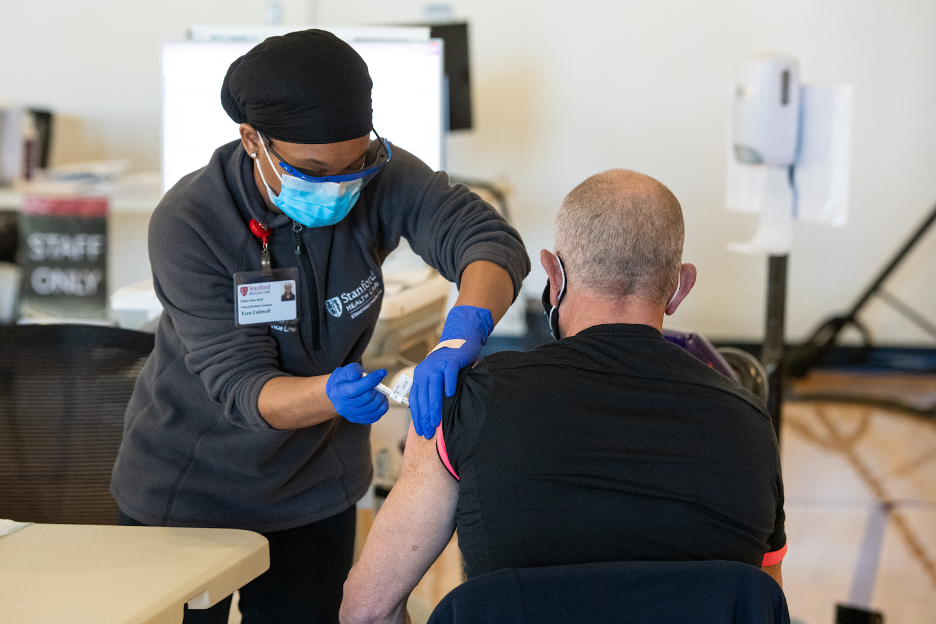Public health officials and a Stanford microbiology and immunology professor are cautiously optimistic that the first protein-based COVID-19 vaccine option will reach individuals who were previously apprehensive about being vaccinated.
The Novavax COVID-19 vaccine was endorsed by the Center for Disease Control and Prevention (CDC) on July 19, after the Food and Drug Administration authorized it for emergency use earlier in July. The two-dose primary series vaccine has been available since early August.
Produced by the American biotechnology company Novavax, the vaccine is the fourth COVID-19 vaccine authorized for use in the U.S. and the first to use traditional protein-based technology. mRNA vaccines, like those of Pfizer-BionNTech and Moderna, instruct cells to make a recognizable COVID-19 protein with no function on its own; the immune system then develops a response to the foreign protein. The Novavax vaccine, on the other hand, uses a more common and older technology that directly introduces the recognizable protein to build immunity.
With some having expressed concerns over receiving an mRNA vaccine during the original vaccine distribution, the Novavax vaccine provides an alternate option to the Pfizer-BioNTech and Moderna mRNA vaccines and the Johnson & Johnson/Janssen viral vector vaccine.
“In the U.S., we’ve saturated the market of people that want to get a vaccine,” said microbiology and immunology professor Holden Maecker. “The problem was more about reaching people who don’t want to get vaccinated.”
Rajeswari Ponnuswamy, who is a family practice physician at the Palo Alto Medical Foundation, said some of her patients declined COVID-19 vaccines over concerns about new technology.
“Now that we have a vaccine that’s using technology that’s been tested for many years, it’ll be easier to convince patients to get vaccinated because we can give them examples of times they had received a vaccine using similar technology, such as that for Hepatitis B,” Ponnuswamy said.
Novavax is 90.4 % effective at preventing infection and 100% effective at preventing severe symptoms, a comparable efficacy to the Pfizer-BioNTech and Moderna vaccines. It also has similar side effects. According to Maecker, experts anticipate that it will likely be similarly limited in preventing infection with the Omicron variant.
“Novavax trials were done well before Omicron became widespread in the U.S., and so [while] our efficacy estimates are quite high for Novavax,” said CDC Advisory Committee on Immunization Practices Chair Grace Lee. “But those efficacy estimates are in a different period of time.”
What truly differentiates the Novavax COVID-19 vaccine is its manufacturing process. According to the Novavax website, the gene for the spike protein from the COVID-19 virus is given to an insect virus, which is then used to infect moth cells. As the virus replicates within the cell, the protein gene is transcribed into mRNA in the nucleus, causing the cell to make large quantities of the protein. After harvesting and purifying the proteins, they are arranged around a nanoparticle core, which will allow the immune system to recognize the protein from different angles if ever infected.
The second component of the vaccine is Novavax’s patented Matrix-M adjuvant. An adjuvant is a substance used to increase the immune response to a vaccine, which can help the immune system to recognize an antigen and provide protection for longer. Novavax sources theirs from saponins, a detergent-like compound found within the bark of the soapbark tree in Chile. When the trees are pruned, the bark is ground and processed into two parts, which are both then freeze-dried into powders containing raw saponins. The two powders are mixed with fats to create Matrix-A and Matrix-C particles. When combined, the Matrix-M adjuvant is formed.
“There is a somewhat novel combination of things in this vaccine,” Maecker said. “But in terms of the class of vaccine, it’s a traditional protein-based formulation.”
According to the CDC, between 26 and 37 million adults in the U.S. are unvaccinated. According to Lee, despite the older technology behind the Novavax vaccine, it is unlikely to sway anti-vaccine anxiety.
A 2022 survey found that “16% of those who are unvaccinated would probably or definitely get a protein-based vaccine, so 84%, despite the availability of a different vaccine platform, are still reluctant to receive a COVID-19 vaccine,” Lee said.
